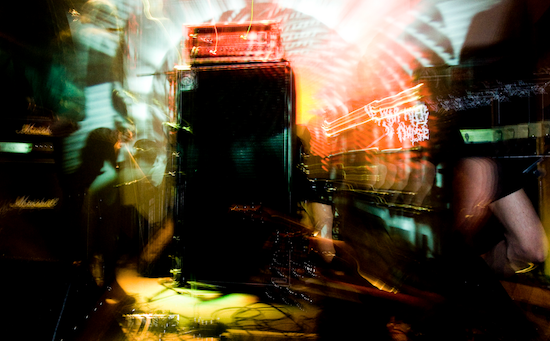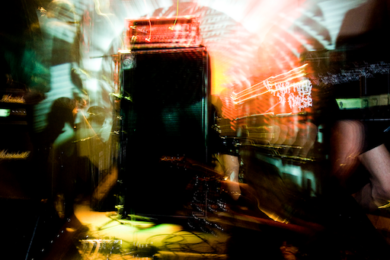Photo: Stu Green / Shot2bits.net
It starts with a howl. Skullflower linchpin Matthew Bower is crouched, primed and proficient in front of his amp, back to the audience. Violinist Samantha Davies steadily formulates a restless drone. The 1981 Michael Wadleigh-directed Wolfen is projected behind them, slowed to a unnatural dirge of salivating jaws and broken glass. There’s a collective intake of breath, and audience braced, it begins.
Skullflower – that shadowy, elusive presence loitering on the peripheries of noise – have been an irresolute soul since the 1980s. Emerging from the power electronics scene, their unique sound and presence consisted of actual band members on bass/drums/guitar, as opposed to one man and his various agitated distortion pedals and tapes. The tendrils of malevolence crept across the Atlantic in the form of debut album Form Destroyer released on Broken Flag, garnering fans in a country they were never to tour. Matthew Bower is the beating heart of Skullflower, everything comes from his diminutive frame. There’s a sprawling back catalogue of side projects, Skullflower releases and collaborations, and albums and live shows released and announced with little fanfare.
Tonight at Cafe Oto, the reach of Skullflower’s sound becomes apparent – metal heads and black metallers alike, a smattering of goths, corduroy-wearing music mathematicians and the art student from Antwerp via Hackney Wick all gather under one roof to encounter the physical rendering of Bowers elegiac, raw sound. From the first howl, barely recognisable as human as it’s forced through distortion it is, at first, an affronting assault. The violin maintains a discordant drone, immovable, and the only undisturbed sound throughout the twenty minute piece. Bowers remains crouched, back to the audience, the whirlpool of white noise, feedback and howls washing over him. Sludgy, Sabbath style riffs are distributed at apparently random intervals but as the piece develops, and the your brain desperately shifts to try and make sense of the gloom, you hear tiny, beautiful subtleties. A tiny worm of a melody is slowly weaving through the dirge, through the feedback, suddenly, the violin seems to shift, and all begins to make sense, like the beam of the sun through a monolithic structure, the at first bewildering array of sounds slot together. And Bower continues to howl.
Set in New York’s disparate dilapidated outskirts and slick, ordered moneyed districts, Wolfen’s prevarication is the haunting of New York by a pair of rabid wolves, invisible to the human eye. Bower has tonight chosen a scene from this film, repeated, slowed down. A hulking black wolf smashes through the elaborate glass of a penthouse apartment, skidding onto the immaculate Martini bar and stands arched, eyes wide as saucers, jaws salivating on the peachy, fragrant carpet at the couple inside. Nature, in all it’s malevolent forces, is something Bower explores within the sound and artwork of Skullflower. No matter how sophisticated, clean and orderly the human world is (and specifically the scene in Wolfen, how gilded) nature will eventually push through, disruptive, distressing and unpredictable. We pave the ground for us to walk on, and the roots of trees travelling many feet push up through the concrete, knotty and intractable, buildings we live and work in are clawed at by ivy, inhabited by insects and vermin.
There are some of Skullflower’s contemporaries who are elevated above the natural order of things – from the cold, highly conceptual Merzbow to the spiritual ascension and ambience of Coil to the dark, distressing Nurse With Wound, but Skullflower have their feet firmly in the mud – their face down in the soil, smelling the damp leaves and moss, staring up at the sky and all it throws at us. This is what makes Skullflower such a compelling live experience. It’s cleansing and spiritual in a most pagan way – as uncomfortable as wet rocks but once you break through the husk, it’s as refreshing as a morning walk through a dewy forest.



